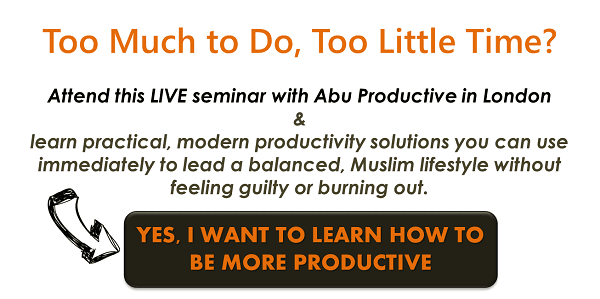
Ramadan is a month in which we increased our spirituality and strengthen our relationship with the Qur’an. Ramadan can be overwhelming for women, as we strive to balance family, siblings, extended family, work and social obligations. At the same time, we want to increase our ibaadah and spiritual development, and the balance can be very challenging.
Somehow, with lots of du’a, a Ramadan plan and less sleep, many sisters do manage their duties and become more productive in their ibaadah during this blessed month (alhamdulilah!). The important question is, how can we continue to balance our different duties and roles, and continue a high level of ibaadah after Ramadan too?
In this article, I will mention some practical solutions on how to continue our acts of worship after Ramadan, so we consistently feel the infamous Ramadan imaan-high!
The Post-Ramadan Action Plan!
Here are a few tips of continuing our Ramadan habits after Ramadan to ensure we remain on that spiritual high:
- We all know the famous saying, “failing to plan, is planning to fail”. We were all advised to have a plan for Ramadan. So why not have one for after Ramadan? Ramadan is a great time to bond with the family, so ensure you involve them in the post-Ramadan action plan too.
- Going to bed early gives our spiritual development a great motivational boost. By performing wudu, praying two nawafil (voluntary rakaah) and the accompanying du’as we say before going to bed, you will wake up refreshed and energised.
- Ramadan was a time of late mosque visits and standing long, listening to beautiful recitation during taraweeh. Continuing tahajjud after Ramadan is a invaluable habit, even if it’s only for 15 minutes before Fajr. Allah loves actions that are small and consistent.
- Recite the Qur’an regularly, even if it is a page a day, to make sure you are keeping that Ramadan-connection with the Qur’an. Take 1-2 hours out a week to ponder and reflect over its meaning by reading translation or tafsir.
- Dhikr is a well-established practice during Ramadan. Save 5-10 minutes for morning and evening adhkar, and utter the words while you do other chores or work.
- A healthy body full of vitality is very important. The Prophet Muhammad
 said, “Your body has a right over you” [Bukhari]. It’s important to embark on a healthy well balanced eating plan to cope with the demands of fasting, and it is as important to continue healthy eating after Ramadan, to give your body renewed energy levels and vitality for ibaadah and all your other duties after Ramadan.
said, “Your body has a right over you” [Bukhari]. It’s important to embark on a healthy well balanced eating plan to cope with the demands of fasting, and it is as important to continue healthy eating after Ramadan, to give your body renewed energy levels and vitality for ibaadah and all your other duties after Ramadan. - A must have for sisters is “me-time”, to relax and also reconnect with Allah
 . It could be as simple as treating yourself to a nice cup of tea, whilst your husband, siblings or extended family take the kids from you for a while. Even if you have no children, you still need sometime to recuperate from work, household and family obligations. You can spend this time making dhikr and reflecting on your performance during Ramadan.
. It could be as simple as treating yourself to a nice cup of tea, whilst your husband, siblings or extended family take the kids from you for a while. Even if you have no children, you still need sometime to recuperate from work, household and family obligations. You can spend this time making dhikr and reflecting on your performance during Ramadan. - Light exercise such as walking or cycling for 15-20 minutes a few times a week, will also give us a motivational boost and increase our energy levels. You can even have walks with your children or with your husband – whatever floats your boat.
Balancing Household Obligations after Ramadan
Our household, work and social obligations still remain after Ramadan. Here are tips to continue our Ramadan habits so we can make the most effective use of our time:
- Stock up food cupboards with food you will need for about a month, as this decreases weekly shopping trips and impulse buys
- Just as leftovers were great for suhoor during Ramadan, be creative and use leftovers to make the meal for the next day
- Have regular mini halaqahs with your family; the children will love the continued feeling of Ramadan.
- Take power naps when you can! Mothers often find this difficult to do; schedule 20 minutes when you have dropped your kids off to school, or after work before starting on the next activity.
- Plan activities for your children to keep them busy while you complete other duties or even take that nap!
Endless Cooking!
“Feeding fasting people can be fulfilled by a simple one or two course meal rather than a four course one that takes up so much time leading to me being very tired and unproductive”, claims a mum-to-be.
This is a principle we can continue after Ramadan:
- Have a meeting with your family and decide on the meals you will be having throughout the month and getting the whole family involved is a great way of lightening the load.
- Delegate household activities to your husband, children, neighbours and extended family. My kids love to be empowered during the month of Ramadan to be involved in choosing and cooking light healthy meals. Ramadan is a perfect opportunity for families to eat and do activities together and this should be continued after Ramadan too.
- Share your post-Ramadan goals with your family and let them know that you want to continue the spirituality of Ramadan, and would appreciate their help with the household activities. This will ensure you have more energy and free time to focus on the Qur’an and in your worship to Allah
 , even after Ramadan.
, even after Ramadan.
Keep up the Support Networks
Ramadan is a time where sisters make an extra effort to visit the masjid, especially for taraweeh prayers, which instilled the “Ramadan-feeling” into us. Greeting sisters every evening and standing together in prayer are things we may miss after Ramadan, and may make sisters feel lonely once the blessed month is over.
Here are a few things you can do in your community to continue the support network in the masjid after Ramadan:
- Simply organise for family to babysit for a few hours while you go to the masjid. This could be when you have your “me-time”!
- Have a mothers and kids meeting club; ideally, this could be in a hall within the masjid. This gives the mothers a chance to go to the masjid and the children to socialise with other kids in the community.
- Organise small events and gatherings in the masjid, and especially invite single sisters, single parents and others you know are on their own. Involve them and show that you care for their well-being, not just during Ramadan but after Ramadan too.
So, there you have it sisters! Your comprehensive post-Ramadan action plan to ensure that you continue your Ramadan ibaadah, even when the blessed month is over. Comment below with your tips and advice on keeping the spiritual high after Ramadan!
About the Author:
Khafaya Abdulsalam is a mother of four, providing practical parenting workshops, seminars and professional coaching services to Muslim mothers across the globe and empowering Muslimahs to be the mothers they want their kids to see. She aims to take motherhood to the 3rd degree by equipping Muslim mothers with tools, practical tips and techniques on how to be masters of motherhood, raising happy, confident and productive Muslim kids!
Most importantly, Khafayah trains mothers on how to re-discover themselves in order to perform the most important role assigned to them by Allah SWT – Motherhood! Visit her website at http://www.ummuka.com


 said, “Your body has a right over you” [
said, “Your body has a right over you” [ . It could be as simple as treating yourself to a nice cup of tea, whilst your husband, siblings or extended family take the kids from you for a while. Even if you have no children, you still need sometime to recuperate from work, household and family obligations. You can spend this time making dhikr and reflecting on your performance during Ramadan.
. It could be as simple as treating yourself to a nice cup of tea, whilst your husband, siblings or extended family take the kids from you for a while. Even if you have no children, you still need sometime to recuperate from work, household and family obligations. You can spend this time making dhikr and reflecting on your performance during Ramadan.


